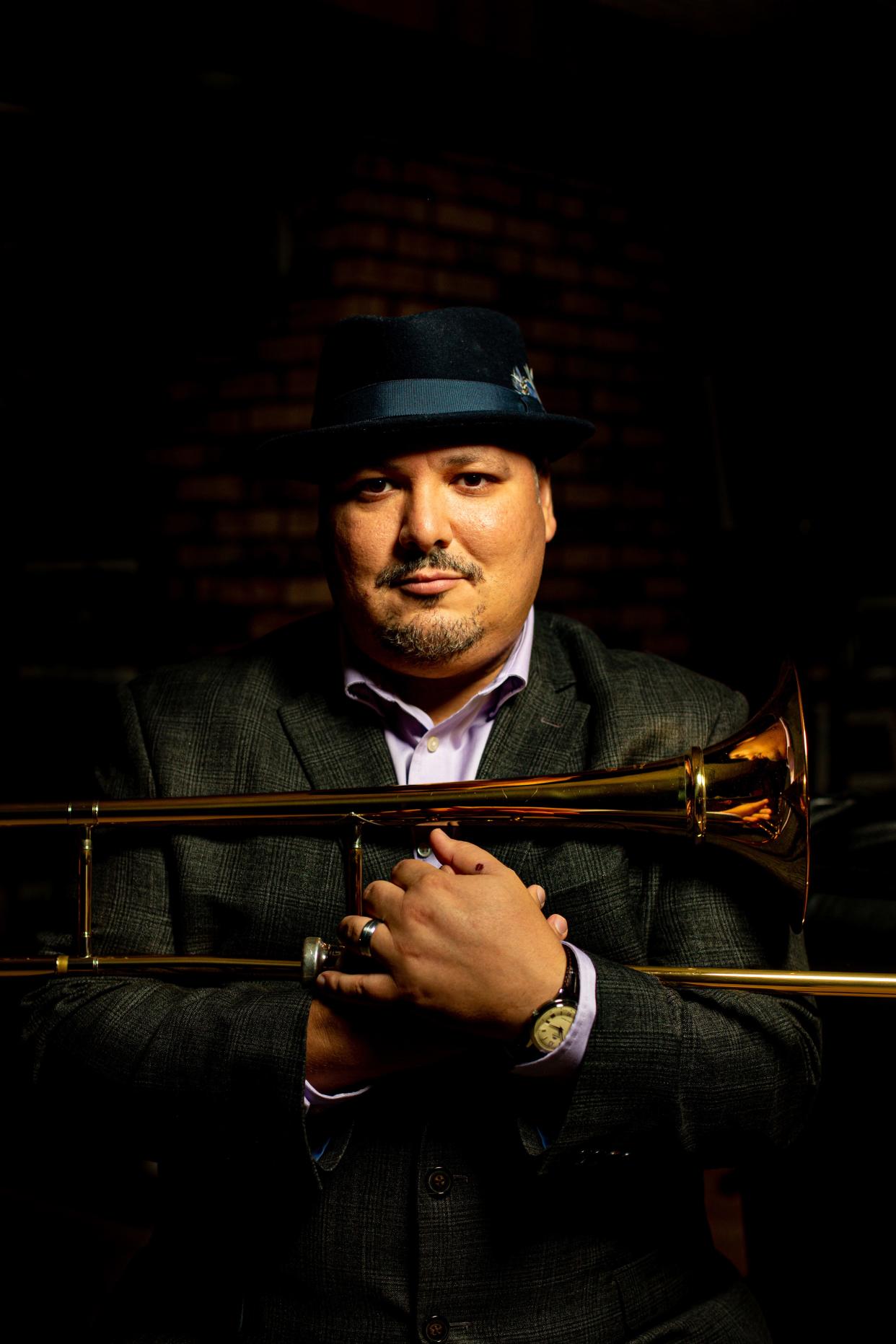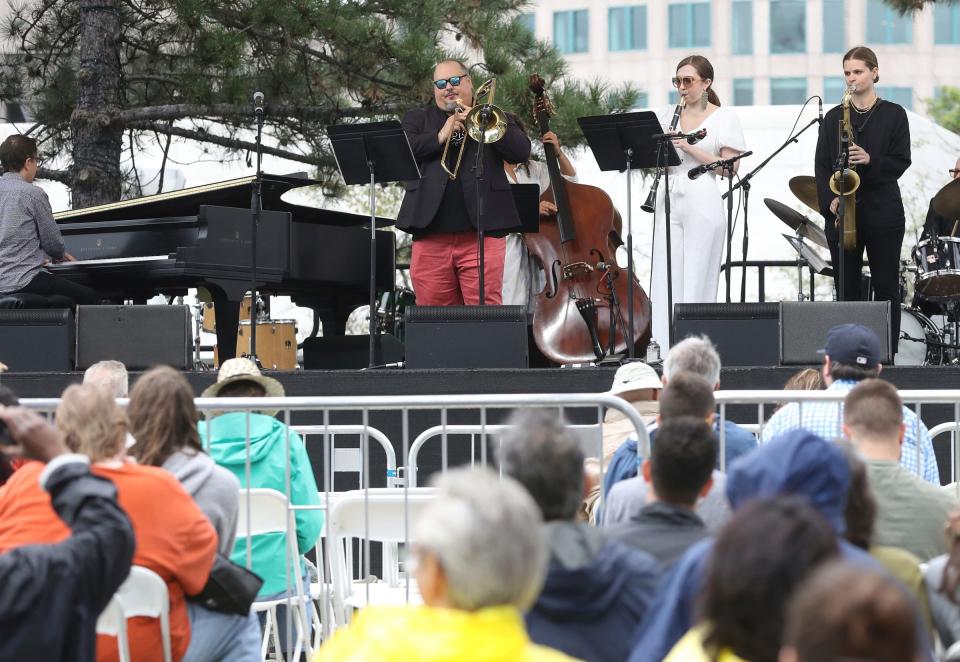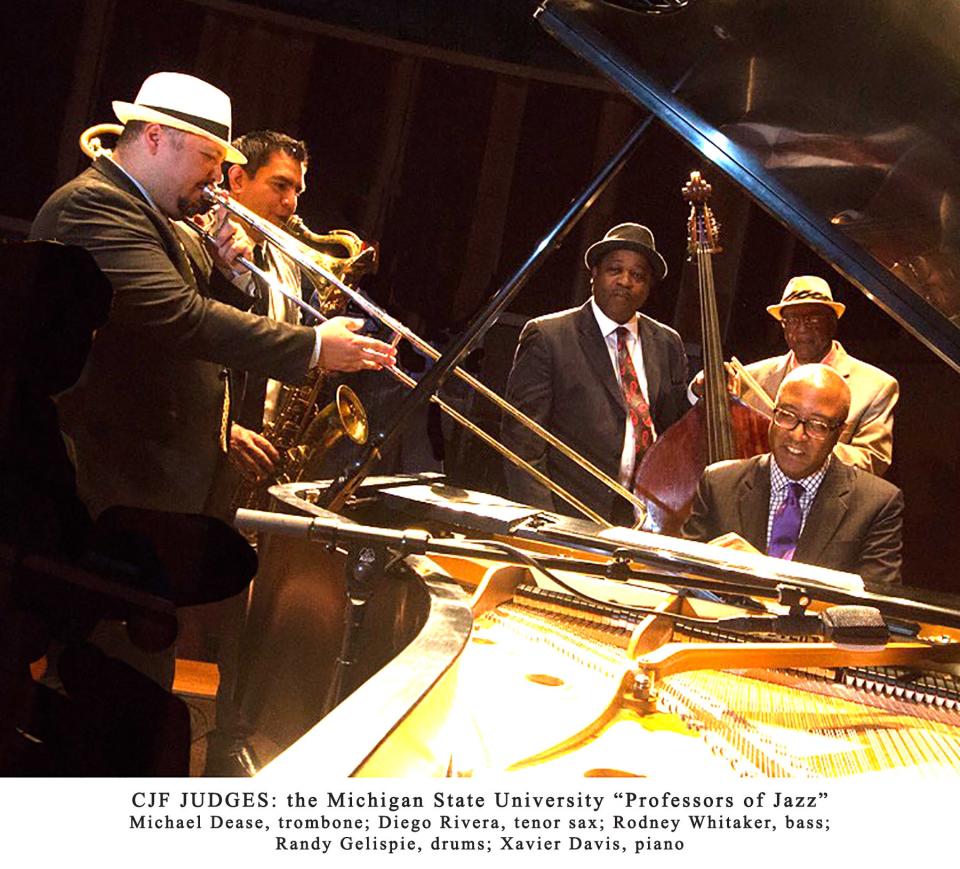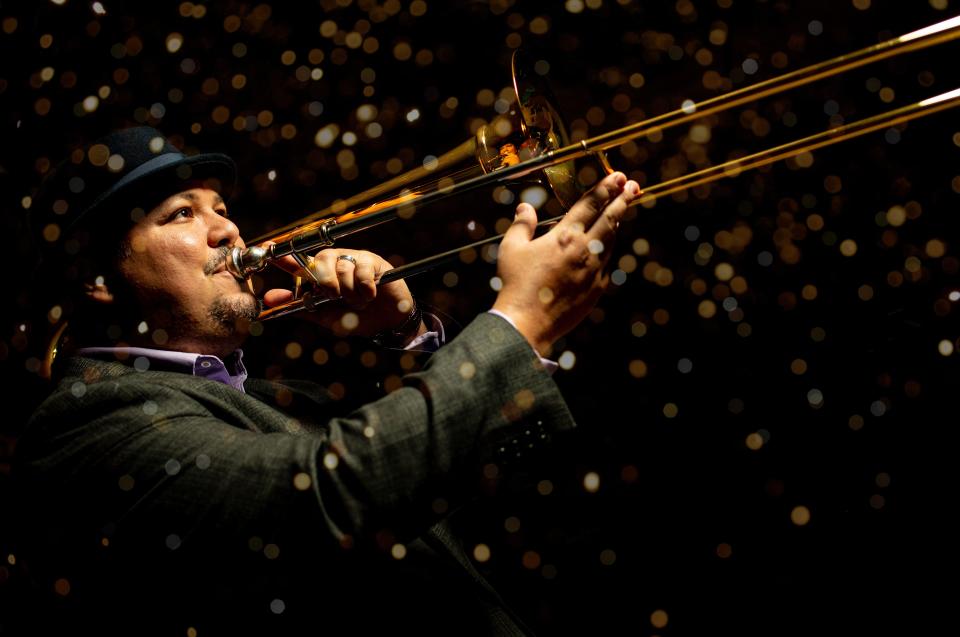The musical journey of MSU's Michael Dease: 'I have to play the trombone'

- Oops!Something went wrong.Please try again later.
Watching jazz trombonist Michael Dease improvise solos in front of a wailing big band is like watching a high-flying trapeze artist.
He soars to great heights, takes huge risks, depends on the team for support, creates new maneuvers to thrill the audience and loves the entire experience.
He stands out not only for his great musical ideas and playing technique, but for his rich, silky trombone tone.
Dease, professor of Jazz Trombone at the Michigan State University College of Music, is at the pinnacle of his career both in academia and performance.
“There is more happening right now than has ever happened," Dease said. "I’m making the best collaborations of my life.”
Dease, 40, has released 17 solo albums, and as a sideman has appeared in 250 discs. He has played with the biggest names in music and was named Trombonist of the Year by Jazz Times (2020) and by Downbeat (2021). He was also named Distinguished Professor of the Year at MSU in 2019.
You’ll be able to see him with The Michael Dease Quartet at the Summer Solstice Jazz Festival on June 24 in downtown East Lansing.
Now considered one of the finest jazz trombonists in the world, Dease began his musical journey at age 11 as a saxophone player in Augusta, Georgia. He didn’t touch the trombone until he was at the ripe old age of 17.
“My dad liked doo-wop and I used to listen to his records," Dease said. "When I began making up my own parts in the marching band, my director told me to save it for the jazz band. I really couldn’t get my footing with the saxophone.”
Dease was a talented sax player who was a star in the middle school and high school bands, but a series of events changed his life. His parents, who had had a rocky marriage for years, finally broke up (“an epic separation”), leaving him alone and depressed.
“My dad disappeared for a year and a half and I had to get a job to help pay the bills," Dease said. "I needed to get something to put a lot into and get a lot out of.”
At 17, a friend brought him a CD. It was one of the greatest jazz CDs ever produced — “Blue Train” with John Coltrane on saxophone and Curtis Fuller on trombone.
“That record led me to a religious conversion," Dease said. "I gave up the saxophone completely because I never heard a trombone play with that style before and I wanted to do it.”
As Dease was still working through sadness and depression, the sliding and emotion expressed by Fuller’s trombone playing spoke to him in a meaningful way.
“I gave up the saxophone and switched to the trombone and it took off," he said. "My band director was not happy because he needed me in his band on alto saxophone. I told him, 'I know better than you. I have to play the trombone.' ”
It was a spiritual calling for Dease.
He borrowed a trombone from a friend and copied trombone solos from many jazz records. He learned all of Fuller’s solos by heart.
Dease says, “I was never inspired so intensely on the saxophone. I just learned trombone by ear. I listened to hundreds of records by all the great jazz trombone players, especially J.J. Johnson.
“I didn’t know chord changes or anything, but I figured that if I tried to sound like a genius, maybe it would happen.”
It did.
Even though he started on the trombone late, Juilliard — considered by many the pre-eminent music school in the U.S. — saw his talent and offered Dease a full scholarship.
Yet while Dease was musically gifted, he was not educated. The country boy from Georgia found himself in Manhattan and he suffered.
“It was hard," Dease said. "I was behind everyone else. I had so much remedial work to do. My embouchure (lip position on mouthpiece) needed fixing, my posture was bad. I was nervous and anxious.
”My first reaction to being in Juilliard was being afraid and freezing. New York was completely different from where I came from. I was broke, by myself and in a big city. All I did was try not to get kicked out. After a while, I admitted to myself that I had a lot of work to do."
But Dease was focused and he made it happen. During the first year at Juilliard, he buried himself in listening to more and more jazz greats.
“I began to understand jazz. If you don’t know what you’re listening for, jazz can be a mess," he said.
Slowly, Dease began to get a few gigs in New York.

The big turnaround came during the summer after his first year at Juilliard when he got a three-month job on the Norwegian Cruise Line cruise ship. “That’s where I had all day, every day to practice," Deas said. "I listened to CDs. I played for other musicians on the ship and for myself.”
When he came back in September, he was noticed. One musician told him, “You sound like a different player.”
“I’m in the right place,” Dease told himself. “I was meant to do this. Maybe I can play music for a living.”
At that point, gigs started coming his way like ocean waves. And he took additional classes in jazz theory and classical music theory.
From that point, things were like a dream. He played seven nights a week — club dates, wedding bands, rock music, alt rock and jazz. He was playing with Illinois Jacquet, Christian McBride, Lincoln Center big band, Slide Hampton and many others.
Dease went on to receive his master's degree from Juilliard and taught at universities throughout the New York area.
“I’m playing with everyone I want to play with, did several musical arrangements, but I also loved teaching,” he said.

After several years of recording and playing, Dease decided to look for a full-time university position. He knew and respected Rodney Whittaker (director of the MSU jazz program) and Etienne Charles (at the time, MSU jazz trumpet professor) and made a list of the schools he would consider working at. MSU landed at the top of the list.
MSU snapped him up and assigned percussion prof Gwendolyn Burgett to show him around the world of academia. That worked very well in many ways. Gwen changed her name in a couple of years to Dease and they now have a family together.
But building a career and family in East Lansing did not stop Dease from playing with the likes of Alicia Keyes, Wycliffe Gordon, Paul Schaffer, Elton John and Neil Diamond, among others.
And going full circle, he is also playing baritone saxophone on his newly released albums.
IF YOU GO
Summer Solstice Jazz Festival
Friday, June 23 and Saturday, June 24
Free admission. Several outdoor stages in downtown East Lansing.
Check out the entire schedule at eljazzfest.com

This article originally appeared on Lansing State Journal: The musical journey of Michael Dease: 'I have to play the trombone'

